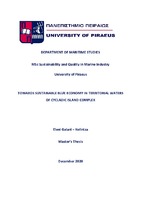| dc.contributor.advisor | Σακελλαριάδου, Φανή | |
| dc.contributor.author | Γαλάνη - Κολίντζα, Ελένη | |
| dc.contributor.author | Galani - Kolintza, Eleni | |
| dc.date.accessioned | 2021-01-15T08:33:40Z | |
| dc.date.available | 2021-01-15T08:33:40Z | |
| dc.date.issued | 2020-12 | |
| dc.identifier.uri | https://dione.lib.unipi.gr/xmlui/handle/unipi/13173 | |
| dc.identifier.uri | http://dx.doi.org/10.26267/unipi_dione/596 | |
| dc.format.extent | 99 | el |
| dc.language.iso | en | el |
| dc.publisher | Πανεπιστήμιο Πειραιώς | el |
| dc.rights | Attribution-NoDerivatives 4.0 Διεθνές | * |
| dc.rights | Attribution-NonCommercial-NoDerivatives 4.0 Διεθνές | * |
| dc.rights.uri | http://creativecommons.org/licenses/by-nc-nd/4.0/ | * |
| dc.title | Towards sustainable blue economy in territorial waters of Cycladic island complex | el |
| dc.type | Master Thesis | el |
| dc.contributor.department | Σχολή Ναυτιλίας και Βιομηχανίας. Τμήμα Ναυτιλιακών Σπουδών | el |
| dc.description.abstractEN | Human population and its demand for land, energy and natural resources is growing, creating pressure on marine ecosystems. The uses and users on seas are increasing. Very careful weighing of different user interests against one another and in particular against environmental concerns is required. It is of vital importance to achieve a sustainable development and to ensure that equilibrium is maintained. The role of Marine Spatial Planning (MSP) aims to contribute through effective management of marine resources and sustainable use of them. MSP is taking into account the socio-economic and environmental aspects, ensuring the involvement of all stakeholders and their cooperation too, organizing the available accurate data, and sharing knowledge. There are many human activities in the territorial waters of the Cycladic island complex in Greece without appropriate allocation plan. Some of them are already developed in the study area, while other human activities are going to be deployed soon. In both cases, there is a need for each marine activity to be operated and implemented in a sustainable way by balancing its economic growth with the marine environmental conservation and protection. The involvement of the pillars of sustainability into the marine space aims to reduce the pressure from each marine activity on the marine space of the Cyclades. The pillars are considered as key components for the achievement of the Blue Growth Strategy and thus the Blue Economy Concept; but their development is still in early stages in the case study area. The sustainability analysis leaded to the conclusion that there are more opportunities and strengths, than threats and weaknesses towards a Blue Economy in the Cycladic island complex marine space. | el |
| dc.contributor.master | MSc Sustainability and Quality in Marine Industry | el |
| dc.subject.keyword | Marine activities | el |
| dc.subject.keyword | Marine spatial planning | el |
| dc.subject.keyword | Sustainable development | el |
| dc.subject.keyword | Blue growth | el |
| dc.subject.keyword | Blue economy | el |
| dc.subject.keyword | Environmental conservation | el |
| dc.date.defense | 2020-12 | |



